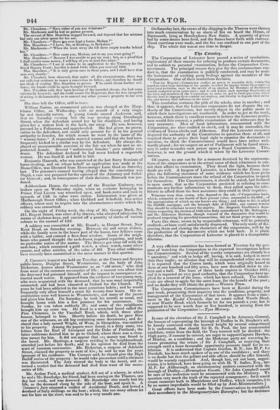llrbe Country.
The Corporation of Leicester have passed a series of resolutions, explanatory of their reasons for refusing to produce certain documents, and to submit to personal examination, before the Corporation Com- missioners. The principal reason they give for this contumacious con- duct is, that the examination is publicly conducted, and may be made the instrument of exciting party feelings against the members of the Corporation. One of their resolutions declares,
" That his Majesty's Commission confers no power to assemble daily within this populous town large meetings of the people, to select for inquiry before them topics of great local irritation, such as the merits of an election for Members of Parliament warmly contested seven years since; and to call before such meetings Magistrates of the town and members of the Corporation, hi order to put to them questions, which directly tend to impugn their conduct and motives, and thereby to degrade their author rity, and destroy their influence in the town."
This resolution contains the pith of the whole, nine in number ; and thus it appears, that the Leicester corporators do not dispute the au- thority of the Commission, but merely object to the public mode in which their investigations are conducted. In order to get at the truth, however, which there is excellent reason to believe the Leicester gentle- men would fain conceal, a public examination of the witnesses may be very necessary. Men of local information, unconnected with the Corporation, are thus enabled to check, and it may be contradict, the evidence of Town-clerks and Aldermen. Had the Leicester recusants disputed the authority of the Commission to question them at all, and required them to prove their legal right to examine the documents in question, we think the Commissioners would have been rather awk- wardly placed ; for we suspect an act of Parliament will be found neces- sary in order to confer such power upon a Royal Commission. This, however, is not the ground which is taken by the Leicester Conser- vatives.
Of course, no one can be for a moment deceived by the representa- tions of the corporators as to the actual cause of their reluctance to sub- mit their affairs to examination. They dread the light, because their deeds are evil. A burgess of Leicester, in a letter to the Times, sup- plies the followina.P statement of some evidence which has been given before the Commissioners since the refusal of the Corporation to speak for themselves. The Commissioners, it should be stated, had declared in open court, that as the Corporation persisted in refusing to com- municate any further information to them, they called upon the inha- bitants to afford them the best assistance they could in their inquiries.
Witnesses were then sworn, who deposed to the sale cf Corporation lands, which, estimated at one fourth of their present value, amounted to 34,8001., of
the appropriation of which no one knows any thing ; and when to this is added the 10,000/. mortgage, and the borough debt of I2,000/., one cannot wonder they should be reluctant to meet the inquiry. Mr. Sergeant Goulburn's depo- sitions respecting the election of 1826 were flatly contradicted by Mr. Babiugton ; and Mr. Alderman Rav,!.son, though warned of the documents that would be produced respecting his parochial transactions, did not think proper to appear.
Facts like these, sworn to by respectable witnesses, will be generally credited—at least until satisfactorily disproved. The only mode of dis- proving them and clearing the characters of the corporators, will be by the production of the documents which are held back. It is plain, therefore, that the Corporation of Leicester is placed in a disreputable dilemma.


















 Previous page
Previous page